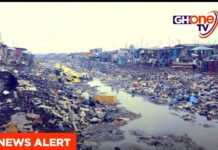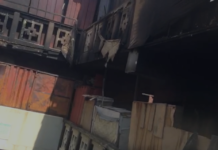
Madina Zongo Junction, Agbogbloshie, Makola, Tudu, Oxford Street, Lapaz, and Kaneshie Market are the communities in Accra with the highest levels of air pollution.
This is according to Data from the monitoring network of the Breathe Accra Project (https://breatheaccra.org/).

These findings are contained a communique issued after a roundtable discussion at the SunLodge Hotel, Tesano, Accra, to deliberate on policy interventions for addressing the growing air pollution problem in Accra and other metropolitan areas of Ghana to mark the maiden Air Quality Awareness Week organized by the Ghana Urban Air Quality Project.
The communique outlined a number of measures the government and other stakeholders must take to address the challenges of air pollution.
Below are the sector-specific recommendations by the experts after the roundtable discussion on the deteriorating air quality in Accra and other parts of the country:
Waste Management Sector
Open burning of waste is a major source of air pollution in cities of Ghana owing to limited and irregular waste collection services. Therefore, to stem open burning of waste, we make the following recommendations:
* Circular economy, a model of resource production and consumption in any economy that involves sharing, leasing, reusing, repairing, refurbishing, and recycling existing materials and products for as long as possible, should be adopted by the government.
* Assemblies engaging “Aboboyaa” operators for the provision of waste management services should encourage them to form co-operatives to help regulate and streamline their activities.
* Segregation of waste should be promoted to enable recycling of components such as plastics, metals and composting of organic waste.
* Assemblies should ensure that contracts signed with waste collection companies are performance-based, with an annual evaluation of these companies by households and termination of contracts of non-performing companies.
* Assemblies should consider punitive measures for households and individuals engaging in open burning of waste.
* Assemblies should ensure they have waste transfer stations in strategic areas of the districts and also endeavour to secure sites in their respective districts for appropriate waste disposal.
* Assemblies should consider linking waste collection services in households to the payment of property rates.
* Operations of in the e-waste sector should be streamlined to stop open burning.
Transport Sector
Vehicular emission is a major source of air pollution in cities of Ghana owing to the growing number of vehicles on the road, many of which do not meet vehicle emission standards. The high number of old, rickety and smoky “tro-tros” and goods-carting vehicles on the roads further compounds the problem.
Therefore, to curb vehicular emissions, we make the following recommendations:
* DVLA and EPA should expedite action on using vehicle testing results to enforce the vehicle emissions standards.
* The Ministry of Transport should improve the intra-city public transport by increasing the vehicle fleet and ensuring that the vehicles are very clean and run according to a scheduled time table. This is the only way to get car owners to leave their cars at home and join the public transport to help decongest the city of vehicular traffic.
* The Ministry of Transport should consider replacing intra-city fleets with electric buses.
* Department of Urban Roads should prioritise the incorporation and construction of walking and cycling lanes in road infrastructure projects to promote active travel.
* Department of Urban Roads should expand its traffic management centre to cover all signals at major traffic intersections and integrate them with actuated signal systems to allow for traffic flow and reduce congestion and emission from idling vehicles.
* City authorities should give consideration to bicycle share system i.e. park and ride
* GRPRTU and PROTOA should sensitize vehicle owners on vehicle maintenance practices.
* The Ministry of Employment and Labour Relations should impress upon corporate organizations to consider introducing remote working to reduce travel to the city.
* Government should invest in private transport operations by rolling out vehicle leasing or hire purchase schemes to help vehicle owners acquire new vehicles and rid the street of the old, rickety, and smoky “tro-tros”.
* Government should provide the enabling environment for manufacturing and assembling of vehicles locally at competitive price to encourage the purchase of new vehicles that meet emission standards.
* Roads that are under construction must be watered (dampen) regularly to prevent dust pollution from loose earth materials.
* Speed limit for vehicles must be reduced to the barest minimum on untarred roads especially in residential neighbourhoods to prevent dust pollution.
Household Energy Sector
Use of biomass fuels, e.g. charcoal, wood, and crop residue for cooking generates high levels of air pollution in the household, termed Household Air Pollution (HAP), and is a major contributor of ambient air pollution. Therefore, to transition households to clean cooking solutions and reduce HAP, we make the following recommendations:
* The National Petroleum Authority’s (NPA) Cylinder Recirculation Model addresses the supply chain and access issues associated with domestic use of LPG and will certainly help to leapfrog many households to LPG. Government should therefore support and sustain this intervention.
* Government should consider removing taxes or levies on LPG to help reduce the consumer price of the product and enable many low-income households to transition to LPG.
* Improved cook stoves should be promoted.
* The Energy Commission should engage CBOs and NGOs to sensitize households on the use of briquettes, a low emitting biomass fuel. In line with this recommendation, Energy Commission should ensure that briquette producing factories are not only exporting their products but are also meeting the demands of consumers locally. Government should consider giving tax incentives to these companies to help reduce the consumer price of the product and render it affordable to households for use. 3 Industrial Sector Industrial emission is a major source of air pollution owing to use of obsolete technologies and the proliferation of unregulated industries. Therefore, to curb industrial emissions, we make the following recommendations:
* The Directorate of Factories Inspectorate (DFI) should ensure that all factories, especially factories in residential areas, are regulated and adhere to emissions standards through the use of newer technology and equipment.
* DFI should enforce prohibition notices after their inspection to prevent factories from operating when found not to meet the required emission standards.
* Factories should place premium on health and safety policies for workers with air pollution issues captured in the policy documents.
* Assemblies should promulgate byelaws that prohibit the establishment of vehicle spraying facilities in residential areas. Vehicle spraying should be carried out only in areas designated for such activities using appropriate spraying boots.
* DFI should regulate activities at construction and building sites to minimise dust pollution. Markets Market centres are air pollution hotpots owing to the numerous cooking and burning activities, gasoline-powered milling machines, and idling of trucks discharging goods. Therefore, to reduce pollution in market centres, we make the following recommendations:
* Assemblies should promulgate byelaws that prohibit the setting of fires at market centres, including waste transfer stations.
* The Environmental Health Department of assemblies should sensitize chop bar owners, roadside food sellers, and fishmongers to avoid the use of biomass fuels and instead patronize LPG. They can also be encouraged to use improved cook stoves which reduces emissions significantly.
* Assemblies should prohibit the use of gasoline-powered milling machines and encourage electric-powered machines.
* Assemblies should have posters at market centres advising drivers to stop vehicle idling.
Signed by: All Participants Participants 1. Prof. Kofi Amegah, Lead, GHAir & Breathe Accra Projects 2. Desmond Appiah, Country Lead, Clean Air Fund (CAF) 3. Mrs. Selina Amoah, Acting Director, Environmental Quality Unit, EPA 4. Ubeidalah Kutia Saed, Head of Quality Control, National Petroleum Authority 5. Ferdinand Yali, Principal Planner, Dept. of Urban Roads 6. Emmanuel Sawyerr, Asst. Chief Inspector, Dept. of Factories Inspectorate 7. George Gashon, Chief Inspector, Dept. of Factories Inspectorate 8. Isaac Esau, Deputy General Secretary, GPRTU 9. Helen B. Oko-Adams, Asst. Transport Officer, LaNMMA 10. Rejoice Owusu-Afriyie, Environmental Health Officer, LaNMMA 11. Florence S. Kuukyi, Director of Public Health, AMA 12. Paa Kwaku Ofosu-tenkorang, Transport Officer, AdMA 13. Andrews Nii Apai-Aborhey, Municipal Environmental Health Officer, AdMA 14. Hamdawaiy Sheriff, Municipal Environmental Health Officer (Rep), AEMA 15. Edward Okai, Asst. Municipal Environmental Health Officer, KoKMA 16. Ishmael Okoe Abbye, Transport Officer, KoKMA
Source: Ghana/Starrfm.com.gh/103.5FM



